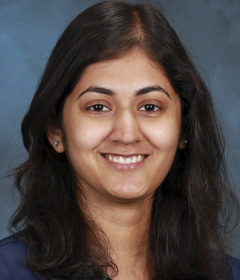Q & A with Vidya Kishore

Through this UT-ORNL center, graduate students like Vidya Kishore can work on Advanced Manufacturing research initiatives taking place at UT and ORNL.
Why is additive manufacturing important?
Vidya: Additive manufacturing makes it possible to create complex structures that would otherwise be impossible or hard to create using traditional manufacturing methods. In addition, it makes manufacturing complex geometries faster and cheaper with significant reduction in weight and also offers the potential to tailor the properties of printed components at specific locations. It makes your imagination tangible.
How has the Bredesen Center experience helped you as a student?
Vidya: The Bredesen Center experience is one of a kind. The interdisciplinary nature helps build a complete experience of skills across the board, while the flexibility and personalized curriculum makes it possible to make the most out of grad school time. I had the opportunity to work with two east Tennessee start-up companies as a part of the entrepreneurship aspect introducing me to business aspects of start-ups, giving me the chance to lead an entrepreneurial team, and connecting me with the rich local entrepreneurial environment.
What opportunities for research/work have you had because of the Bredesen Center?
Vidya: I got introduced to additive manufacturing research at ORNL and have had the opportunity to join Dr. Chad Duty’s group and also work closely with the polymer materials development team at the MDF, led by Dr. Vlastimil Kunc. As a grad student, the possibility of working with the experts in this field and with 3D printers that only a few people in the world get to work on is just fascinating. Being a part of initiatives and projects that’s the first of its kind and knowing that your research is actually making an impact in the real world makes the whole process a lot more exciting and gratifying.